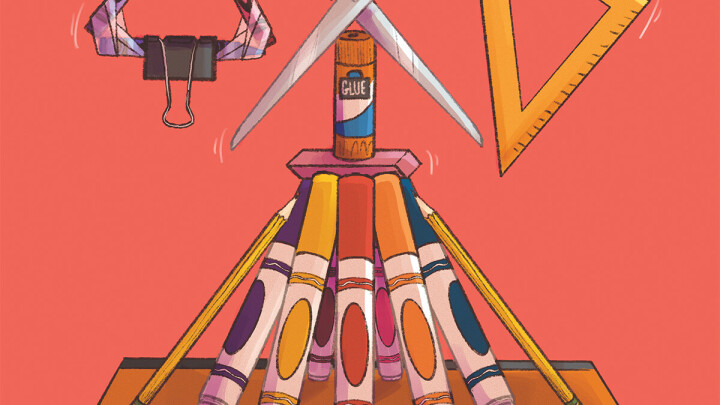Mike Paulus, illustrated by Eva Paulus |
This one’s for all the students out there. And by “students,” I mean “those who learn.” And by “those who learn,” I mean “every single one of you, because life is a journey of constant education.” And by “constant education,” I mean “the relentless onslaught of mortifying experiences proving just how inept we really are at even the most basic tasks of living, and our farcical attempts to overcome our own limitations.”
Got all that?
Well, students, I hope you’re excited for another school year. Before the crushing dread of your scholarly pursuits fully sets in, allow me to offer up a few intellectualistic* talking points from a real, live college graduate.
First off: All this book learning you’re about to do is important. However. As many of my smart, good-looking peers will attest, some of your most important academic realizations will come after graduation. Like what, you ask? Here are some examples, broken down by curricularical** genre.
GRAMMAR & SPELLING
People, you look really dumb if you can’t spell basic words. And you look even dumber if you don’t take time to correct your typo-ridden emails and Very Righteous Facebook Status Updates. Trust me, I know. This is coming from a chronically poor speller and a hasty email sender. I’ve sent texts to my wife that were so packed with typographical nonsense they accidentally unlocked secret features on my phone.
But you look dumberist if you misspell words and overlook typos when you’re trying to sound smart in an online debate. I don’t care if you’re arguing about health care, religion, immigration, the Packers, or the Espionage Act of 1917. People just don’t take you seriously if you can’t spell.
Now, bad grammar doesn’t mean you have a bad point. But it doesn’t help your case.
”
I don’t care if you’re arguing about health care, religion, immigration, the Packers, or the Espionage Act of 1917. People just don’t take you seriously if you can’t spell.

MIKE PAULUS
MATHEMATICS
We all love joking about how high school math teachers should stop teaching kids to solve for the coefficient of the quadratic theorem of the radius of a parabolic triangle, and start teaching kids how to solve real world math mysteries like doing your taxes, figuring out what you owe on a group restaurant tab, and calculating psychic damage dealt to your Level 10 Sorcerer when she’s using Thought Shield.
Jokes like this are funny because they’re true. (But really, any math is good math because it helps you learn to problem solve.)
PHYSICAL EDUCATION
Not important. Eat better. Exercise more. Next!
HISTORY
History is important. Especially when you need an example to back up a point you’re making about health care, religion, immigration, the Packers, or the Espionage Act of 1917. Unfortunately, most history teachers possess an annoying insistence on padding noteworthy historical events with something called “historical context,” because it explains why people actually did what they did or said what they said.
However, it may actually be worth wading though the murky context of historical happenings to find the perfect support you need to back up your flimsy argument against recycling or something dumb like that.
SHOP CLASS
At some point, you will need to know how to use tools. Wanna hang a picture? Bam. You need tools. Wanna replace a light fixture? Bam. You better get some tools. Wanna fix your hot water heater? Bam. You just gotta get them tools!
Wanna add an ejection seat to your car? Bam. You can’t. That’s silly.
Luckily, today’s tool-users possess the greatest tool man has ever invented: YouTube. Seriously, I replaced the whole damn computer system in my oven using nothing but a Phillips head screwdriver and a video I found online. I saved hundreds of dollars, and I didn’t burn my house down. Awesome, right?
ART CLASS
You should take an art class. Yes, yes, the special kind of creative thinking and perspective-tweaking you practice in an art class is applicable to every part of your life, and it’s instrumental in today’s workplace, but forget all that. Take an art history class. This will give you something to talk about when you’re trying to impress people at a bar. Pretty much anything can “remind you” of the work/methods/life story of some boring old painter and make you sound smart and introspective and sexy, whatever you want.
Trust me on this. You’re reading something that got published, so it must be true.
*This is a real word.
**This is not.























